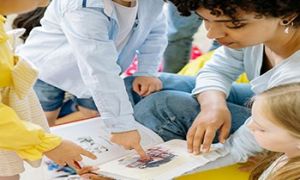Group learning in early childhood offers numerous benefits that support children's cognitive, social, and emotional development. The following article provides information on the Benefits of Group Learning, Group Learning Strategies, Group Learning Activities, Strategies To Encourage Positive Behavior In Group Learning and more.
Benefits of Group Learning
1. Social Development
- Encourages teamwork, cooperation, and communication skills.
- Helps children learn to share, take turns, and resolve conflicts.
2. Cognitive Growth
- Promotes problem-solving and critical thinking.
- Allows children to learn from peers and gain new perspectives.
3. Emotional Well-being
- Builds confidence and a sense of belonging.
- Reduces anxiety by creating a supportive learning environment.
4. Language & Communication Skills
- Enhances vocabulary and expressive language through discussions.
- Encourages active listening and comprehension.
5. Creativity & Exploration
- Fosters curiosity and imaginative thinking.
- Provides opportunities for collaborative projects and hands-on learning.
6. Preparation for Future Learning
- Helps children adapt to structured learning environments.
- Teaches essential life skills like collaboration and adaptability.
Group Learning Strategies
Group learning in early childhood is a powerful approach that fosters collaboration, communication, and problem-solving skills. Here are some effective strategies:
1. Play-Based Learning
- Encourages children to explore and learn through play.
- Supports creativity and social interaction.
2. Small Group Activities
- Dividing children into smaller groups allows for more focused learning.
- Helps educators tailor activities to different skill levels.
3. Peer Teaching
- Encourages children to explain concepts to each other.
- Strengthens understanding and builds confidence.
4. Collaborative Storytelling
- Children create stories together, enhancing language and imagination.
- Encourages teamwork and listening skills.
5. Group Problem-Solving
- Activities like puzzles or building challenges promote critical thinking.
- Helps children learn to work together to find solutions.
6. Circle Time Discussions
- Encourages children to share ideas and listen to others.
- Builds communication and social skills.
Group Learning Activities
Group learning activities in early childhood help children develop social, cognitive, and communication skills while fostering collaboration. Here are some engaging activities:
1. Collaborative Art Projects
- Provide a large canvas or paper for children to create a shared artwork.
- Encourage teamwork by assigning different sections or themes.
2. Storytelling Circles
- Children take turns adding to a story, building creativity and listening skills.
- Use props or puppets to make it interactive.
3. Group Science Experiments
- Simple experiments like mixing colors or making a volcano encourage teamwork.
- Children can hypothesize, observe, and discuss results together.
4. Music & Movement Games
- Activities like dancing in pairs or creating rhythms with instruments promote coordination.
- Singing in groups enhances language development.
5. Building & Construction Challenges
- Provide blocks or recycled materials for children to build structures together.
- Encourages problem-solving and spatial awareness.
6. Outdoor Exploration
- Nature scavenger hunts or gardening projects foster teamwork and curiosity.
- Children learn about the environment while collaborating.
Strategies To Encourage Positive Behavior In Group Learning
Encouraging positive behavior in group learning settings helps create a supportive and collaborative environment. Here are some effective strategies:
1. Set Clear Expectations
- Establish group norms and behavioral expectations from the start.
- Use visual cues or posters to reinforce positive behaviors.
2. Model Positive Behavior
- Demonstrate respectful communication and teamwork.
- Encourage children to observe and imitate positive interactions.
3. Use Positive Reinforcement
- Praise and reward cooperative behavior.
- Implement a system where children earn recognition for kindness and collaboration.
4. Encourage Peer Support
- Assign buddy systems or small teams to promote inclusivity.
- Teach children to help and encourage each other.
5. Provide Engaging Activities
- Use interactive and hands-on learning experiences to maintain engagement.
- Incorporate games and storytelling to make learning fun.
6. Foster a Growth Mindset
- Encourage children to see mistakes as learning opportunities.
- Promote perseverance and problem-solving.
7. Create a Safe & Inclusive Environment
- Ensure all children feel valued and heard.
- Address conflicts constructively and teach emotional regulation.
Further Reading
Group Time With Children In Childcare
30 Indoor Group Games For Toddlers
Working With Mixed Age Groups In An Early Childhood Setting
Strategies To Support Children Who Struggle With Circle Time
Making Yarning Circles More Meaningful
Yarning Circles In Early Childhood Services


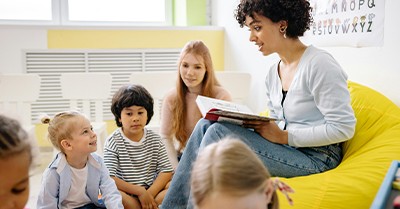

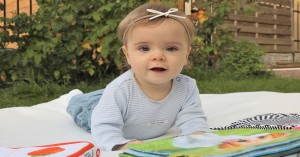


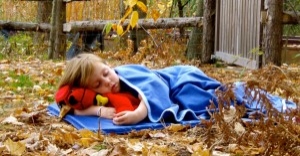 In Norway and most other Scandinavian countries, children nap in the outdoors. According, to research outdoor sleeping not only promotes better daytime sleeping, but it
In Norway and most other Scandinavian countries, children nap in the outdoors. According, to research outdoor sleeping not only promotes better daytime sleeping, but it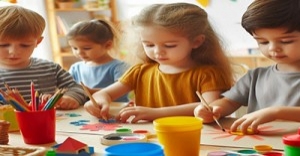 The following article lists 30 art and craft descriptions and links to the EYLF. These can be used as a blurb, during observations, used for
The following article lists 30 art and craft descriptions and links to the EYLF. These can be used as a blurb, during observations, used for Feel Good Feb is dedicated to saying thanks, expressing gratitude, and promoting good deeds and random acts of kindness.
Feel Good Feb is dedicated to saying thanks, expressing gratitude, and promoting good deeds and random acts of kindness.
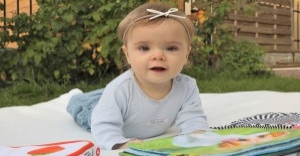 From the earliest months of life, babies thrive when given opportunities to experience the outdoors. Nature is not just a backdrop for play—it is a
From the earliest months of life, babies thrive when given opportunities to experience the outdoors. Nature is not just a backdrop for play—it is a Across the early childhood education and care sector, educators are sounding the alarm: current staffing ratios are insufficient to deliver safe, meaningful, and developmentally appropriate
Across the early childhood education and care sector, educators are sounding the alarm: current staffing ratios are insufficient to deliver safe, meaningful, and developmentally appropriate Thanks to the new National Model Code and upcoming regulatory changes under the National Quality Framework (NQF), early childhood services across Australia must now implement
Thanks to the new National Model Code and upcoming regulatory changes under the National Quality Framework (NQF), early childhood services across Australia must now implement In the quiet hum of a weekday morning, something felt off. Preschool doors opened, but classrooms remained silent. No greetings. No redirection. No educators. And
In the quiet hum of a weekday morning, something felt off. Preschool doors opened, but classrooms remained silent. No greetings. No redirection. No educators. And A: In early childhood education and care (ECEC) settings across Australia, mobile phone use by educators is now subject to strict national reforms aimed at
A: In early childhood education and care (ECEC) settings across Australia, mobile phone use by educators is now subject to strict national reforms aimed at The end of the year is a busy and emotional time in early childhood services. Many services close for a short period over Christmas, and
The end of the year is a busy and emotional time in early childhood services. Many services close for a short period over Christmas, and In early childhood education and care, child safety is not just a number—it’s a practice. While educator-to-child ratios are essential, they are only one part
In early childhood education and care, child safety is not just a number—it’s a practice. While educator-to-child ratios are essential, they are only one part